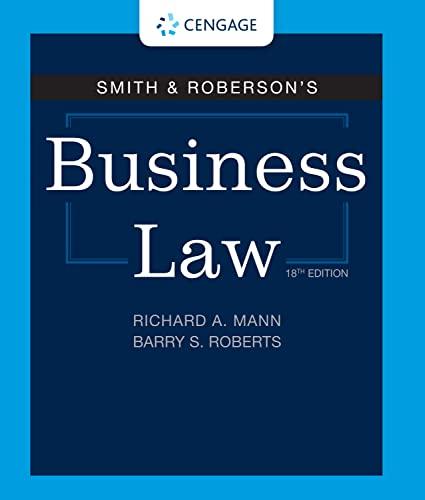Question
READ AND FOLLOW DIRECTIONS !! SUBJECT : CYBER LAW As you recall, the First Amendment protects freedom of expression, including speech, press, and assembly -
READ AND FOLLOW DIRECTIONS !! SUBJECT : CYBER LAW
As you recall, the First Amendment protects freedom of expression, including speech, press, and assembly - all arenas where people and entities/organizations share information and ideas. First Amendment freedoms extend to the gathering of, access to, as well as the expression of information. These freedoms and protections were memorialized in a constitution adopted centuries before a digital world could even be envisioned. However, the cyber and digital domain have changed and expanded how we gather, access and express information and ideas. But how?
The internet and digital technologies have democratized access to information, enabling us to gain easy access to information from a broad array of sources, and now through the use of artificial intelligence (AI) technologies/systems such ChapGPT - all forms of machine learning, as well as web-pages (scholarly and otherwise), blogs, forums, social media, cataloguesand so on. This information may be accurate and trustworthy - or not. And then think about the ease with which individuals, people and organizations can share easily-acquired information and ideas. Many and diverse voices can reach broader audiences and powerfully impact how we think and behave - and you may exercise that power too. And while the spread of knowledge and information has been astonishing, the digital era has also enabled the spread of fake news, disinformation, misinformation, and sometimes even dangerous information.
On a related note, given the rise of social media platforms and online communities, content moderation has become a crucial aspect of managing online spaces. In addition to some limited government intervention, private companies often play a significant role in determining the boundaries of acceptable speech within their platforms. Decisions regarding the removal or restriction of certain content raise questions about the balance between free expression and the responsibility of platform owners to combat harmful or illegal content.
Your answers to some questions here are in part an opportunity to reflect and to show your familiarity with the assigned material.
Answer these questions:
1. Consider you own circumstances as a citizen (presume you are a citizen even if you are not) protected by First Amendment freedoms. What primary sources and means do you use to access, gather, and share/communicate information, ideas and opinions? Be honest and specific, and be sure to include any online sources. Do you believe you are well-informed about current events and issues? Why or why not? Identify some sources you trust, and don't trust, and why. (Please note that I don't care where you lie in the political spectrum, but I do care about well-informed, clear writing.)
2. What roles can and should governments and government institutions in the U.S. play in the removal or restriction of content involving misleading, hateful speech/information, especially in the digital world? Give specific examples and cite sources in the body of the memo.
3. What roles can and should the private sector, especially social media platforms such as Facebook or X, play in the removal or restriction of content involving misleading, hateful information in their platform? Give specific examples and cite sources in the body of the memo.
4. There are many examples of university students who have shouted down university-invited guest speakers with whom they disagree. Find a published example and summarize what happened (cite your source). Do you believe this was an appropriate response? Why or why not? Consider pros, cons, and potential First Amendment concerns.
5. Overall, do you believe the internet and technological developments described in the background section (and perhaps within your own answers to these questions) strengthen or weaken public discourse and democratic processes? Provide some justification and preferably examples.
Step by Step Solution
There are 3 Steps involved in it
Step: 1

Get Instant Access to Expert-Tailored Solutions
See step-by-step solutions with expert insights and AI powered tools for academic success
Step: 2

Step: 3

Ace Your Homework with AI
Get the answers you need in no time with our AI-driven, step-by-step assistance
Get Started


